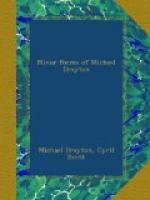Next these, learn’d Johnson, in this
List I bring,
Who had drunke deepe of the Pierian spring, 130
Whose knowledge did him worthily prefer,
And long was Lord here of the Theater,
Who in opinion made our learn’st to sticke,
Whether in Poems rightly dramatique,
Strong Seneca or Plautus, he or they,
Should beare the Buskin, or the Socke away.
Others againe here liued in my dayes,
That haue of vs deserued no lesse praise
For their translations, then the daintiest wit
That on Parnassus thinks, he highst doth sit, 140
And for a chaire may mongst the Muses call,
As the most curious maker of them all;
As reuerent Chapman, who hath brought to vs,
Musaeus, Homer and Hesiodus
Out of the Greeke; and by his skill hath reard
Them to that height, and to our tongue endear’d,
That were those Poets at this day aliue,
To see their bookes thus with vs to suruiue,
They would think, hauing neglected them so long,
They had bin written in the English tongue. 150
And Siluester who from the French more weake,
Made Bartas of his sixe dayes labour speake
In naturall English, who, had he there stayd,
He had done well, and neuer had bewraid
His owne inuention, to haue bin so poore
Who still wrote lesse, in striuing to write more.
Then dainty Sands that hath to English done,
Smooth sliding Ouid, and hath made him run
With so much sweetnesse and vnusuall grace,
As though the neatnesse of the English pace, 160
Should tell the Ietting Lattine that it came
But slowly after, as though stiff and lame.
So Scotland sent vs hither, for our owne
That man, whose name I euer would haue knowne,
To stand by mine, that most ingenious knight,
My Alexander, to whom in his right,
I want extreamely, yet in speaking thus
I doe but shew the loue, that was twixt vs,
And not his numbers which were braue and hie,
So like his mind, was his clear Poesie, 170
And my deare Drummond to whom much I owe
For his much loue, and proud I was to know,
His poesie, for which two worthy men,
I Menstry still shall loue, and Hauthorne-den.
Then the two Beamounts and my Browne arose,
My deare companions whom I freely chose
My bosome friends; and in their seuerall wayes,
Rightly borne Poets, and in these last dayes,
Men of much note, and no lesse nobler parts,
Such as haue freely tould to me their hearts, 180
As I have mine to them; but if you shall
Say in your knowledge, that these be not all
Haue writ in numbers, be inform’d that I
Only my selfe, to these few men doe tye,
Who had drunke deepe of the Pierian spring, 130
Whose knowledge did him worthily prefer,
And long was Lord here of the Theater,
Who in opinion made our learn’st to sticke,
Whether in Poems rightly dramatique,
Strong Seneca or Plautus, he or they,
Should beare the Buskin, or the Socke away.
Others againe here liued in my dayes,
That haue of vs deserued no lesse praise
For their translations, then the daintiest wit
That on Parnassus thinks, he highst doth sit, 140
And for a chaire may mongst the Muses call,
As the most curious maker of them all;
As reuerent Chapman, who hath brought to vs,
Musaeus, Homer and Hesiodus
Out of the Greeke; and by his skill hath reard
Them to that height, and to our tongue endear’d,
That were those Poets at this day aliue,
To see their bookes thus with vs to suruiue,
They would think, hauing neglected them so long,
They had bin written in the English tongue. 150
And Siluester who from the French more weake,
Made Bartas of his sixe dayes labour speake
In naturall English, who, had he there stayd,
He had done well, and neuer had bewraid
His owne inuention, to haue bin so poore
Who still wrote lesse, in striuing to write more.
Then dainty Sands that hath to English done,
Smooth sliding Ouid, and hath made him run
With so much sweetnesse and vnusuall grace,
As though the neatnesse of the English pace, 160
Should tell the Ietting Lattine that it came
But slowly after, as though stiff and lame.
So Scotland sent vs hither, for our owne
That man, whose name I euer would haue knowne,
To stand by mine, that most ingenious knight,
My Alexander, to whom in his right,
I want extreamely, yet in speaking thus
I doe but shew the loue, that was twixt vs,
And not his numbers which were braue and hie,
So like his mind, was his clear Poesie, 170
And my deare Drummond to whom much I owe
For his much loue, and proud I was to know,
His poesie, for which two worthy men,
I Menstry still shall loue, and Hauthorne-den.
Then the two Beamounts and my Browne arose,
My deare companions whom I freely chose
My bosome friends; and in their seuerall wayes,
Rightly borne Poets, and in these last dayes,
Men of much note, and no lesse nobler parts,
Such as haue freely tould to me their hearts, 180
As I have mine to them; but if you shall
Say in your knowledge, that these be not all
Haue writ in numbers, be inform’d that I
Only my selfe, to these few men doe tye,




